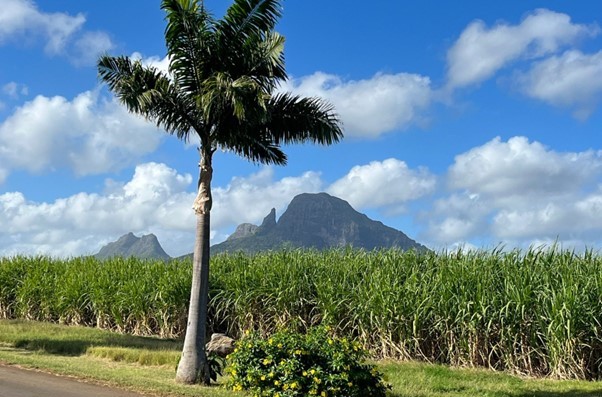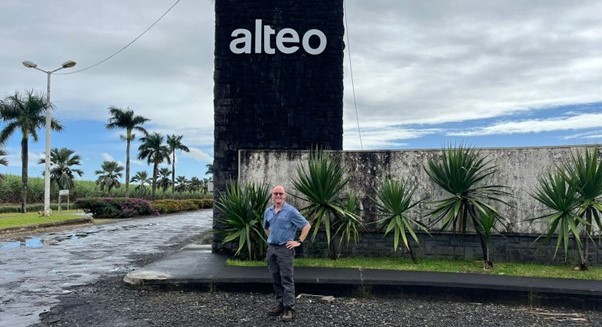28th July 2023
Written by Mike Ogg, our Regional Head for Africa and the Middle East
Sugarcane is an integral part of Mauritian life. I recently spent a week in Mauritius meeting several Bonsucro members and a wide range of companies in the sugarcane industry, including representatives from the rum sector, corporate growers, and smallholders. These meetings highlighted how the industry is united behind a vision of sustainability – and it is looking to certification to achieve it.

Today Mauritius produces around 3,000,000 tonnes of sugarcane, which supplies the three mills on the island. Sugar is marketed and distributed by the Mauritius Sugar Syndicate, an organization that is driving the vision of sustainability in the industry. The mills have also diversified into electricity generation, ethanol production and rum.
Sustainability challenges in Mauritius
In recent decades the island’s economy has transformed from being dominated by the agricultural sector and the trade of sugarcane, with hospitality, finance and technology now much more prominent. This means the sugarcane industry faces significant competition for land from other industries and agricultural commodities. To date, some of the most suitable areas of land for sugarcane production have been lost to tourism, commercial and housing developments. This is especially important considering the decreasing productivity of cultivated land and low yields of sugarcane over the last few years.
Another important challenge for the sugarcane industry is ensuring access to sufficient water supplies in the face of increased competition. Sugarcane is a water-intensive crop, and the country is on its way to becoming water-stressed (defined as when a territory withdraws 25% or more of its renewable freshwater resources). The Mauritian government is in the process of enacting a new water act, and is understood to be introducing new water licenses with stricter parameters.
However, interestingly, Mauritius faces fewer sustainability challenges than the rest of Africa. There are robust laws regarding human rights and sugarcane production has been mechanised, protecting workers. The climate on the island also varies significantly over the course of a year, meaning the industry is used to adopting different production practices – so they may be resilient to future climate change risks.
Growing interest in certification
As I met with companies from across the industry, I saw there was a growing interest in Bonsucro membership and certification against both our Production Standard and Chain of Custody Standard. The Mauritius Sugar Syndicate told me that the markets are asking for greater amounts of Bonsucro-certified sugar certification will ensure Mauritius’ access to these markets, bringing economic benefit to the country. It is clear from my meetings that the Mauritian sugarcane industry is collectively pursuing sustainability, and I hope Mauritius proves an inspiration to other countries to follow in its footstep.

Mike standing outside Bonsucro member Alteo
Positive feedback about certification
Omnicane and Alteo are two mills who are both Bonsucro members, and achieved certification against the Bonsucro Production Standard in 2019 and 2021 respectively. Both were extremely positive about their certification. They indicated that achieving certification was relatively easy, and both feel that it has driven improvements in their operations.
The Bonsucro Production Standard provides a credible roadmap to more sustainable production practices for organisations. It requires producers to develop and implement a water stewardship plan, encouraging producers to think about how they can maximise water efficiency and sustainability – vital as water resources become scarcer in countries like Mauritius.
Certification also brought benefits beyond improving operations. Omnicane and the ENL Group, a standalone farming operation that supplies Omnicane, indicated their individual certification journeys have brought the two entities together and improved relations. Throughout my trip, I was encouraged by how willing companies were to work with others in order to achieve certification and become more sustainable.
Opportunities for the industry in Mauritius and further afield
Currently the industry in Mauritius is focused on increasing productivity. Since sugarcane roots become weaker with regular harvesting, yields go down, causing farmers to delay the replanting of their sugarcane while they save money. The Mauritius Cane Industry Authority has set up a fund to help farmers finance the replanting, which will boost yields due to the fresh, stronger roots. The industry is also looking to improve its water footprint and greenhouse gas emissions. The Bonscuro Production Standard can guide producers as they address their water use and greenhouse gas emissions in their operations.
There is also an opportunity for the industry regarding energy production in Mauritius. The country is securing its energy for the future and has recently released the National Biomass Framework to encourage the production of renewable energy by landowners. This framework puts a lot of emphasis on the sugarcane industry providing significant amounts of feedstock for power generation. By 2030 sugarcane is forecast to contribute 70% of electricity production from local biomass.
I have asked some of the key players in the industry, from the Mauritian Sugar Syndicate to mills’ employees who have pushed for certification, to share their learnings on certification with sugarcane organisations across Africa. I believe this will be of enormous benefit to the continent, helping to demystify the Standards and encouraging sustainable sugarcane production.
I am impressed by the Mauritian sugarcane industry’s dedication to sustainability, especially in the face of increased competition from other industries regarding land and water resources. I have also come away from my trip encouraged by the many positive experiences of certification I heard – as Regional Head for Africa and the Middle East, I can help others across the continent achieve certification for themselves and realise similar benefits.
With growing interest in Bonsucro membership and a shared vision of sustainability across the Mauritian sugarcane industry, I believe Bonsucro in Mauritius will go from strength to strength in the coming years.
If you are based in Africa and the Middle East, and want to find out more about certification, you can contact Mike here.




